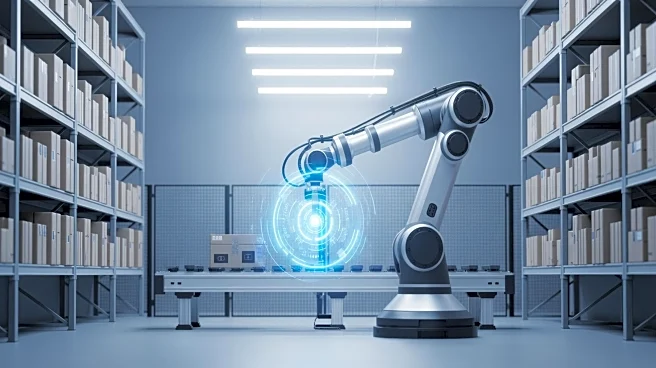What's Happening?
Amazon is set to implement its largest-ever round of layoffs, affecting up to 30,000 corporate jobs, which constitutes roughly 10% of its office workforce. The layoffs are part of a broader strategy to enhance
efficiency through AI and automation, as stated by CEO Andy Jassy. The company aims to reduce costs following pandemic overhiring and to boost productivity. The layoffs will impact multiple divisions, including human resources, devices, services, and operations. Amazon's stock has reacted positively to the news, indicating investor approval of the cost-cutting measures.
Why It's Important?
The layoffs at Amazon highlight a significant shift in corporate strategy, emphasizing AI-driven productivity and cost efficiency. This move reflects broader trends in the tech industry, where companies are reevaluating staffing needs in light of technological advancements. While Amazon's stock has seen gains, the layoffs could have substantial implications for the affected employees and the job market. The decision underscores the growing influence of AI in reshaping workforce dynamics, potentially leading to more streamlined operations but also raising concerns about job displacement.
What's Next?
Amazon plans to continue its focus on AI and automation, which may lead to further workforce reductions in the future. The company is also hiring 250,000 seasonal workers for the holiday season, indicating a strategic shift towards maintaining operational capacity while reducing corporate overhead. Investors will be closely monitoring Amazon's upcoming third-quarter earnings report for insights into its financial performance and strategic direction. The broader tech industry may follow Amazon's lead, potentially resulting in similar cost-cutting measures across other companies.
Beyond the Headlines
The layoffs at Amazon could signal a long-term shift in employment patterns, with AI and automation playing a central role in corporate restructuring. This raises ethical and societal questions about the balance between technological advancement and job security. As companies increasingly rely on AI, there may be a need for policies that address workforce transitions and support affected employees. The development also highlights the importance of investing in skills training and education to prepare workers for new roles in an AI-driven economy.









